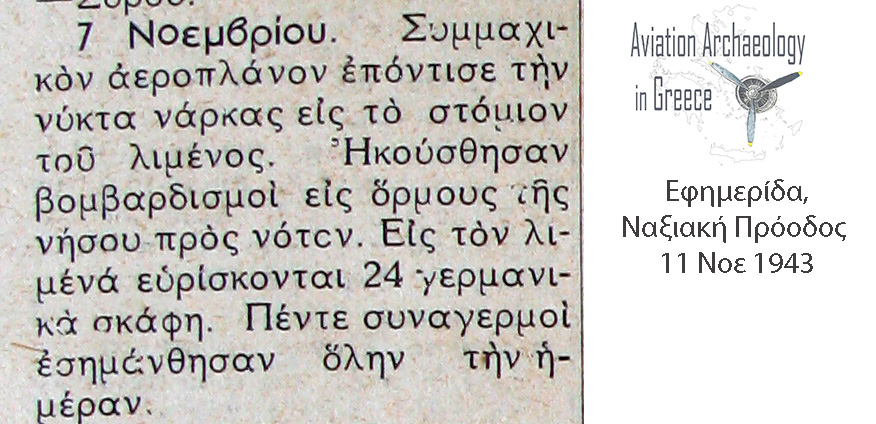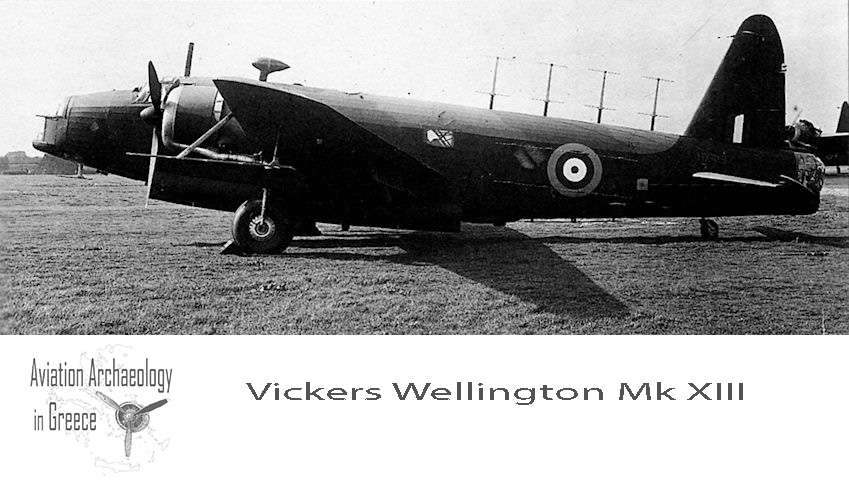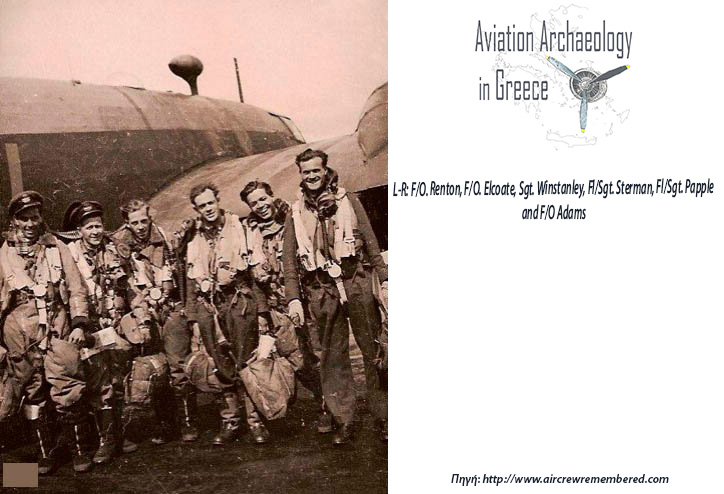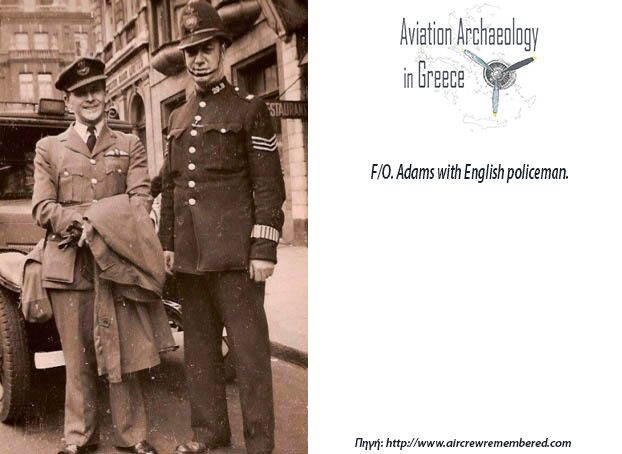
Στις 6 Νοεμβρίου 1943 βραδυνές ώρες, αεροσκάφος Vickers Wellington απογειώθηκε από την Βεγγάζη της Λιβύης με αποστολή τον εντοπισμό, την ναρκοθέτηση και βομβαρδισμό εχθρικών στόχων στο λιμάνι της Νάξου.
Πιθανώς η πρόσκρουση σε νάρκη και η βύθιση του γερμανικού ατμόπλοιου ALMA,στην είσοδο του λιμανιού της Νάξου στις 23/11/1943, να οφείλεται στις νάρκες που είχαν ποντιστεί από το Wellington Mk13.
Το αεροσκάφος Wellington Mk.XIII, s/n MP705 με πιλότο τον Robert Watson ADAMS και πλήρωμα τους F/O Arthur John SPENCER (Pilot 2) 133746 RAFVR (+16-4-1945 Runnymede Mem.), Sgt. Travers Kilfera FALKINER (Air bomber) AUS400701 RAAF, F/Sgt. D. BROOME 1030902 RAF, Sgt. J. B. FARRELL 1268415, Sgt. W. TROWBRIDGE 1163901, εντόπισε τα γερμανικά πλοία αγκυροβολημένα στο λιμάνι της Νάξου.
Σύμφωνα με την εφημερίδα Ναξιάκη Πρόοδος (11/11/1943), στο λιμάνι της Νάξου βρίσκονταν αγκυροβολημένα 24 γερμανικά πλοία. Μετά τη ρίψη 16 βόμβων, μία από τις δύο μηχανές του αεροπλάνου χτυπήθηκε από γερμανικό αντιαεροπορικό. Το αεροσκάφος μετά από ανεμοπορία και με την βοήθεια της μίας μηχανής προσθαλασσώθηκε σε κοντινή απόσταση από τα παράλια της Σίφνου. Όλα τα μέλη του πληρώματος διασώθηκαν. Η ταυτοποίηση του αεροσκάφους πραγματοποιήθηκε το 2014.
Ακολουθούν αποσπάσματα με μαρτυρίες του πιλότου Robert Watson Adams, για τις συνθήκες που επικρατούσαν στο νησί της Σίφνου, καθώς και το πώς κατάφεραν να επιζήσουν .
EX-PILOT AIDED FOREIGNERS WHO HID SOLDIERS
March 1, 2003
Robert (Bob) Watson Adams, past president of a society set up to honour and assist individuals who risked their lives helping allied airmen evade capture during the Second World War, died in Toronto this month of cancer. He was 82.
- Adams was a 22-year-old Canadian pilot on loan to Britain’s Royal Air Force when his plane was shot down after bombing a German ship in southern Greece.
Stout-hearted people on two small islands in the Aegean, risking torture or execution for their actions, sheltered the six-man crew for a month until they were rescued. After the war, Mr. Adams founded a chain of tool-rental stores in the Toronto area called “Adams Rent-All”, which he sold when he retired in 1989. In 1965, Mr. Adams joined the newly formed Canadian Branch of the Royal Air Forces Escaping Society (http://www.rafinfo.org.uk/rafescape/crafes.htm). The group vowed to assist the citizens who had helped allied airmen who fell into their midst escape or evade capture; thanks to their courage, almost 3,000 men had made it back to safety. “The object of the Canadian Branch of the Royal Air Forces Escaping Society is to remember, ” the group’s literature says, “and to aid our helpers who may still be suffering the results of imprisonment and torture at the hands of the enemy, and to maintain the very strong friendships that developed during those years.” (Ernest Bevin, Britain’s Foreign Secretary in 1945-51, told the first Chairman of the group’s British Chapter: “Your society does a damned sight more good in Europe than all my Ambassadors rolled together.”) John Dix, a fellow member of the escaping society’s Canadian branch, said that, “in most cases, we only knew our helpers a week or less — we were just passing through. But the nature of the relationship and the tension of the times were such that they became lifelong friends. We never forgot them, we had them over to Canada every year, and we kept in touch. We owed them a debt of honor.”
Flight Lieutenant Adams and his crew of four Britons and an Australian left their base in Benghazi, Libya, on the night of November 6, 1943, scouting for targets to bomb. They spotted a German ship anchored off Naxos, an island in the Cyclades group south of Athens. After dropping 16 bombs, one of the plane’s two engines was hit by German flak. “Luckily, it kept going for 10 minutes, which gave us time to make a getaway, Mr. Adams told his daughter, Patricia Adams. ” Then it conked out and we had to slowly descend.” He ditched his disabled Wellington bomber flawlessly into the sea. The crew escaped through hatches, and a dinghy with a parachute popped out of the aircraft before it sank within 30 seconds of hitting the water. The men paddled ashore to the island of Sifnos, half a kilometer away. “After complaining about our cigarettes being wet, we slept in the parachute under an olive tree, Mr. Adams recalled.” In the morning, we were discovered by a girl riding by on a donkey.She went to fetch her father, George Karavos, and he went and got someone who could understand English and who decided we weren’t German.” The initial suspicion was mutual. When Mr. Karavos took the men to his home and offered them water, they were afraid to drink it, until the farmer reassured them by taking a first sip. The six men were hidden first in a mountaintop monastery on Sifnos, and then in a cave used as a goat pen on the neighbouring island of Serifos. Their presence was kept from local children, in case they unwittingly tipped off the German patrol that visited the islands several times a week from the nearby occupied island of Milos. “During the war, 180 people on Sifnos died because they didn’t have enough to eat, Mr. Adams said, “but the locals made a big fuss over us, bringing food and cigarettes.” The men spent 10 days in the monastery, with a stream of hungry people climbing the steep path to bring them bread and cheese, oranges, figs, retsina wine and handfuls of precious, rationed cigarettes. Then the Sifnos Chief of Police, Demetrius Bakeas, who was determined the men should not be captured, arranged for them to go to Serifos, because “there are people there who can help you.” A fisherman took them under cover of darkness to Serifos. There, housed in the goat pen, they found five British commandos spying on German troop movements. Conditions were primitive in that cave for the next 20 days, but the spies had a wireless and were able to arrange the air crew’s rescue. A Royal Navy gunboat, disguised as a Greek fishing vessel, picked them up and, moving by night, took them to safety in Cyprus. All six men survived the war, and later learned they had succeeded in sinking that ship in Naxos Harbour.
- Adams kept in touch with his helpers after the war, with his letters translated for him by a Greek neighbour in Toronto.
“I remember being taken to Greek community functions, ” Patricia Adams recalled, “and every Christmas dad would send a parcel to the school on Sifnos, with paper and pencils, and little dime-store gifts for the children. Putting that package together every year was very emotional.” “Bob was a very great guy, with a great sense of humour,” said Roy Brown, Secretary of the Canadian Branch of the Royal Air Forces Escaping Society. Mr. Adams was Treasurer of the Society at his death, and served as President in 1995-96. “We have about 100 members now across the country, who are in their 80’s and beyond”, Mr. Brown said, “and most of our helpers are in the same or worse shape, so we’re not bringing them over as we did up until five or six years ago. But we still help out when we see a helper in need.” Robert (Bob) Watson Adams was born on January 22, 1921, in Windsor, Ontario, where his father, Dr. Frederick Adams, was the Medical Officer of Health for more than 20 years. If he had returned to base that night after the raid on Naxos Harbour, he would have received the cable informing him of his father’s death back home. After graduating from Windsor’s Kennedy Collegiate in 1939, Mr. Adams worked in a bank before enlisting in June, 1941. A few weeks later his older brother, Coulson, was killed during training in England, shot down by a German night fighter that had sneaked across the English Channel. His other brother, John, was also a bomber pilot killed in action, shot down during a raid on Hannover, Germany, just a few months before the war in Europe ended. Robert Adams’s story was featured in a Canadian Broadcasting Corporation television documentary in 1966, when a telescope camera crew followed him and his wife, Joan, back to Sifnos, where they received a hero’s welcome. “Those Greeks had nothing to gain and everything to lose, ” Mr. Adams told the show’s Associate Producer, George Ronald. “They were starving, and yet they gave us everything. they were superb…. I don’t think they know just how kind and generous and how brave they were.”
- Bakeas, who had moved to Athens after retiring from the Police Force, returned to Sifnos for the emotional reunion held 23 years after he helped save Mr. Adams’s life. Earlier, he had written to “my dear friend” in Canada: “It is not possible for me to forget the danger which connected us in those terrible war days. We shall be always waiting you.”
In addition to his wife, Mr. Adams leaves his children John, Patricia and Mary, sons-in-law Lawrence Solomon and Steve Douglas, and granddaughters Essie and Catharine. Robert (Bob) Watson Adams, chain-store founder and past President of the Canadian Branch of the Royal Air Force Escaping Society, born in Windsor, Ontario, on January 22, 1921, died in Toronto on February 10, 2003.




